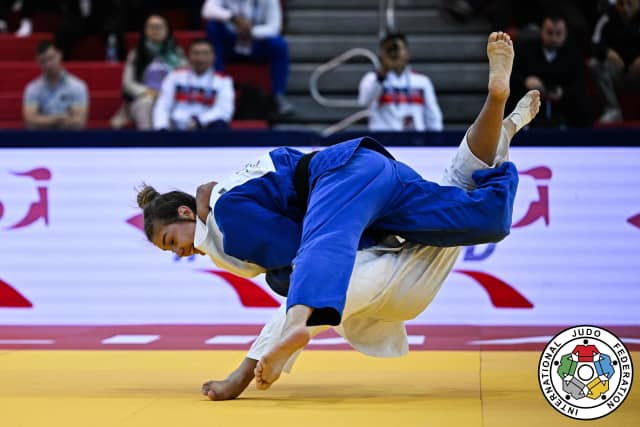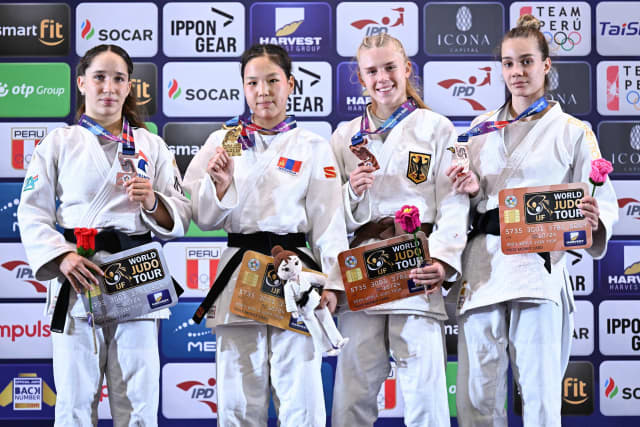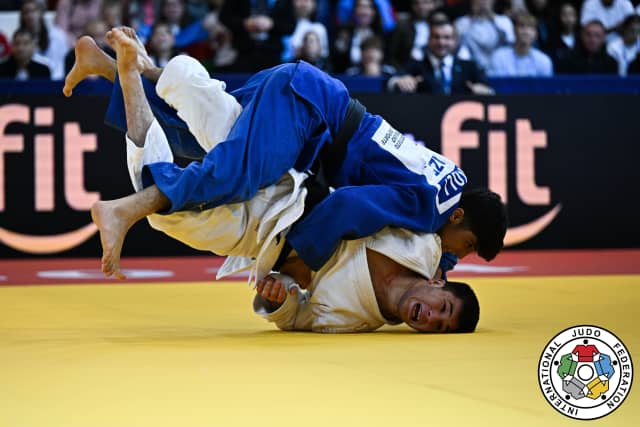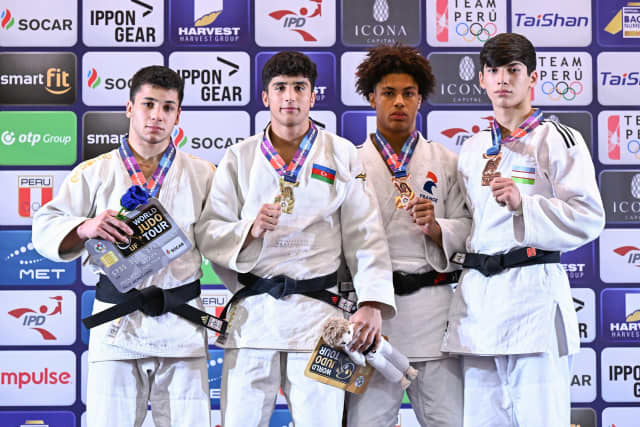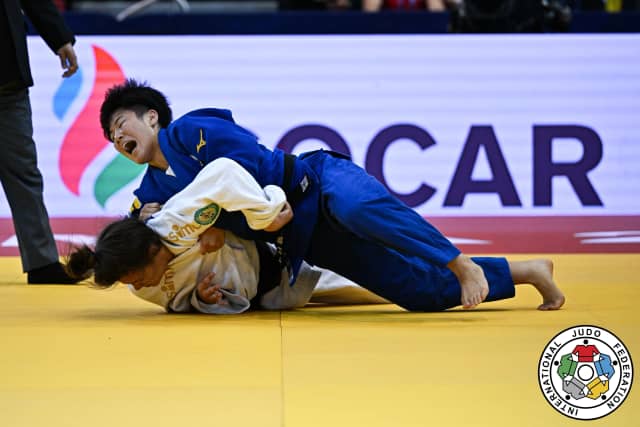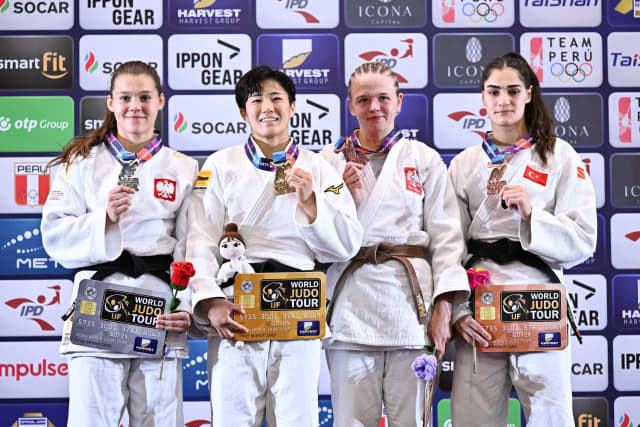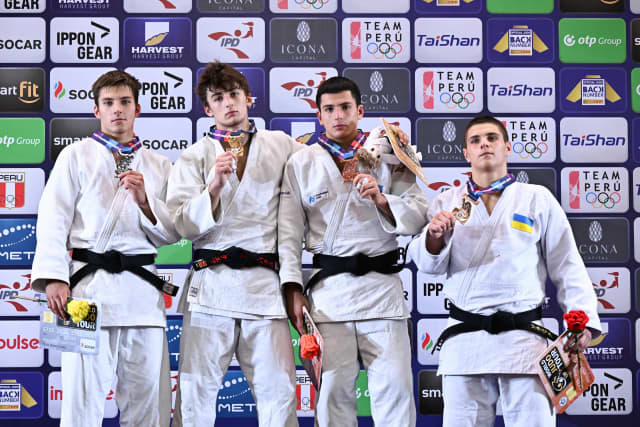Brazil remains in third place but with Mongolia now in hot pursuit, Terbish delivering an outstanding gold at -57 kg to accompany the two silvers and a bronze already in hand. The final standings cannot be predicted; the last day of individual competition will be the decider.
Results -57 kg
Final (-57 kg)
Bronze Medal Fights (-57 kg)
In the first medal contests of the afternoon, Jolina Reinhold (GER) and Talyana Abdallah (FRA) hunted a bronze at -57 kg, the latter logging the first score, a waza-ari from a huge uchi-mata sukashi. Reinhold was attacking well but seemed to not be considering her opponents position when doing so, giving rise to such counters. Against the run of play though, she found her rhythm and equalised with a makikomi at the halfway point, adding to the tension in the arena. 14 seconds into golden score Reinhold finally connected the uchi-mata that had put her under such pressure in the early stages of the contest and she threw for ippon, letting out a cheer of relief.
The second bronze medal would go to either Tsendbazar Mashbat (MGL), the world number 4, or Evelina Bosiek (IJF), world number 104! Mashbat opened the bidding with an attack that she drove and drove into her opponent but with such force that she lost control and Bosiek countered for a score. Bosiek then continued to threaten with her very fast sumi-gaeshi. However, it was an o-uchi-gari which brought her a second score and the bronze medal.
Agati-Alouache (FRA) and Terbish (MGL) fought for the biggest prize of the category. Terbish took everyone by surprise throwing for waza-ari straight off the grip with a seoi-otoshi. Agati-Alouache returned fire with a near turnover and from that point things became more even. Even things stayed and Mongolia took a first gold of this world championship.
Final Results (-57 kg)
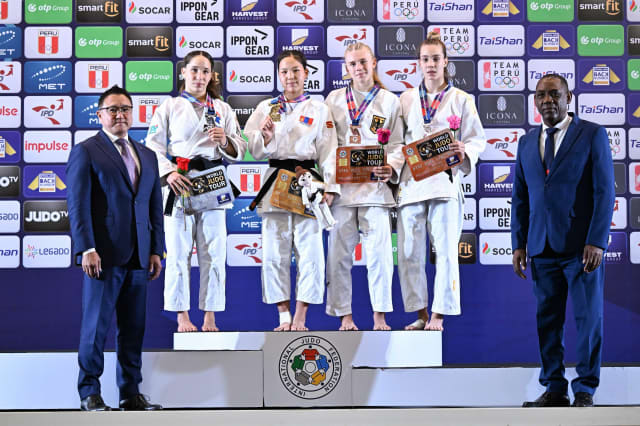
Results -73 kg
Final (-73 kg)
Bronze Medal Fights (-73 kg)
It was an all-French bronze medal contest to open the -73 kg segment of the final block. Salah scored first with a counter but Boue equalised with his own just seconds later. The most impressive element of their fight was the intense will to win and to throw from both athletes. Often same-nation contests produce a sort of frozen judo but not in this case. Eventually Boue earned a second score, winning from waza-ari down and in fine style.
The second fight of the category saw Bakhodirov (UZB) take on Racka (LTU) who had dropped into the contest from his semi-final loss against Davidov (IJF). The former put in a very fast seoi-otoshi to score early and put the Lithuanian under pressure. At almost the two minute mark though, Racka did some excellent ne-waza to secure a hold down but could only keep it for seven seconds, Bakhodirov avoiding having his score equalised. He then doubled his score with a second seoi-otoshi to ensure the medal would fly home with him to Uzbekistan.
Tsuri-goshi was Ibadli’s opening gambit in the final, Davidov defending hard but still going a waza-ari down. Ibadli continued his onslaught, head and shoulders above the rest of his group in Lima and took his second score, tying up the arms of Davidov and entering with a huge ko-soto-gake, one his sempai Rustam Orujov would have been proud of. It was gold for Jasur Ibadli (AZE).
Final Results (-73 kg)
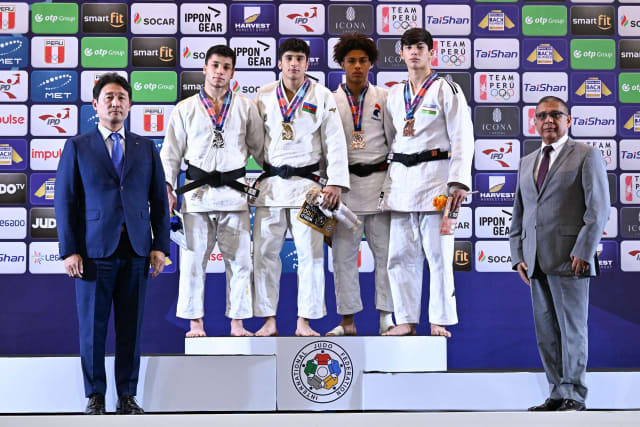
Results -63 kg
Final (-63 kg)
Bronze Medal Fights (-63 kg)
Eighth seed Maila Pagliaro (ITA) was under the cosh against Amelia Ptasinska, Poland’s world number 5. The Italian attacked enough but without enough preparation to put the Pole at risk. Ptasinska is the current European cadet champion and not by accident. She gripped and moved well and waited for the right moment to counter one of the Italian’s seoi-otoshi’s perfectly for ippon. She adds a world cadet bronze to her CV.
Lucia Carpio Fernandez (ESP) and Sinem Oruc (TUR) fought for the second bronze medal of the category. These judoka are only one place apart on the cadet World Ranking List and they have studied each other well. Oruc was able, however, to make her well known soto-makikomi work and she scored with it at the halfway point. The Spanish judoka then came close to evening things up after an o-uchi-gari knocked Oruc off her feet but without the right landing for a score. On the bell, Oruc then countered Carpio Fernandez’s final attempt to ensure it was an ippon win. Oruc’s bronze medal is Turkiye’s first medal at this championship.
The final was riddled with powerful attacks and impressive defence but really only in one direction. Honoka Kimura was in charge, giving no space for Hanna Zaitseva to apply her best judo but every time Kimura attacked there was a defence strategy in place. In transition Kimura was also very dangerous and came close to finishing the contest several times. Zaitseva’s flexibility saved her more than once but in the end Kimura turned her and held her for the win in golden score. It was the only contest of the day in which Kimura couldn’t slice through her opposition at will and so this silver medal is in the correct hands, an excellent day for the Polish team. Kiumra is the new world cadet champion, another gold for Japan.
Final Results (-63 kg)

Results -81 kg
Final (-81 kg)
Bronze Medal Fights (-81 kg)
Mehdi Abbasov (AZE) challenged Belgium’s Kenzo Cremer for the first -81 kg bronze medal. They both delivered strong wins in the morning session but it was the ne-waza of Abbasov which proved to be most advantageous. He held Cremers for ippon in the third minute of the contest to win a bronze medal fro him and Azerbaijan.
Mykhailo Solianyk (UKR) and Rassul Mukhum (KAZ) fought for the second medal of the category. A win for Mukhum would put Kazakhstan on the medal table but it was not going to be easy against the world number 5. After a tough battle, with only 7 seconds on the clock, they were separated by the Ukrainian’s soto-makikomi and Kazakhstan would have to reach the medal table another way. Ukraine had their second bronze medal of the tournament.
Ilia Simonov and Abu-Bakr Kantaev competed for gold and it took them 7 minutes to decide who should have it. Kantaev, the higher ranked of the two, took the win with a neat combination just into the eighth minute. They will of course share the podium, Simonov a worthy silver medallist.
Final Results (-81 kg)
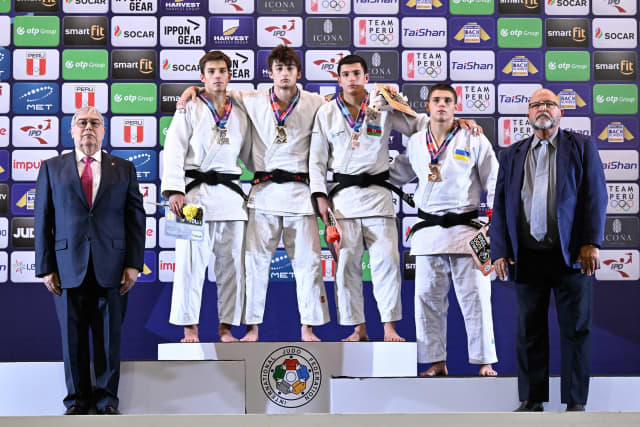
Day 3 is over, the final day on individual competition is just a few hours away, all contests available live on JudoTV. Tune in tomorrow to see who will be crwoned world champion in the heavyweight categories.




